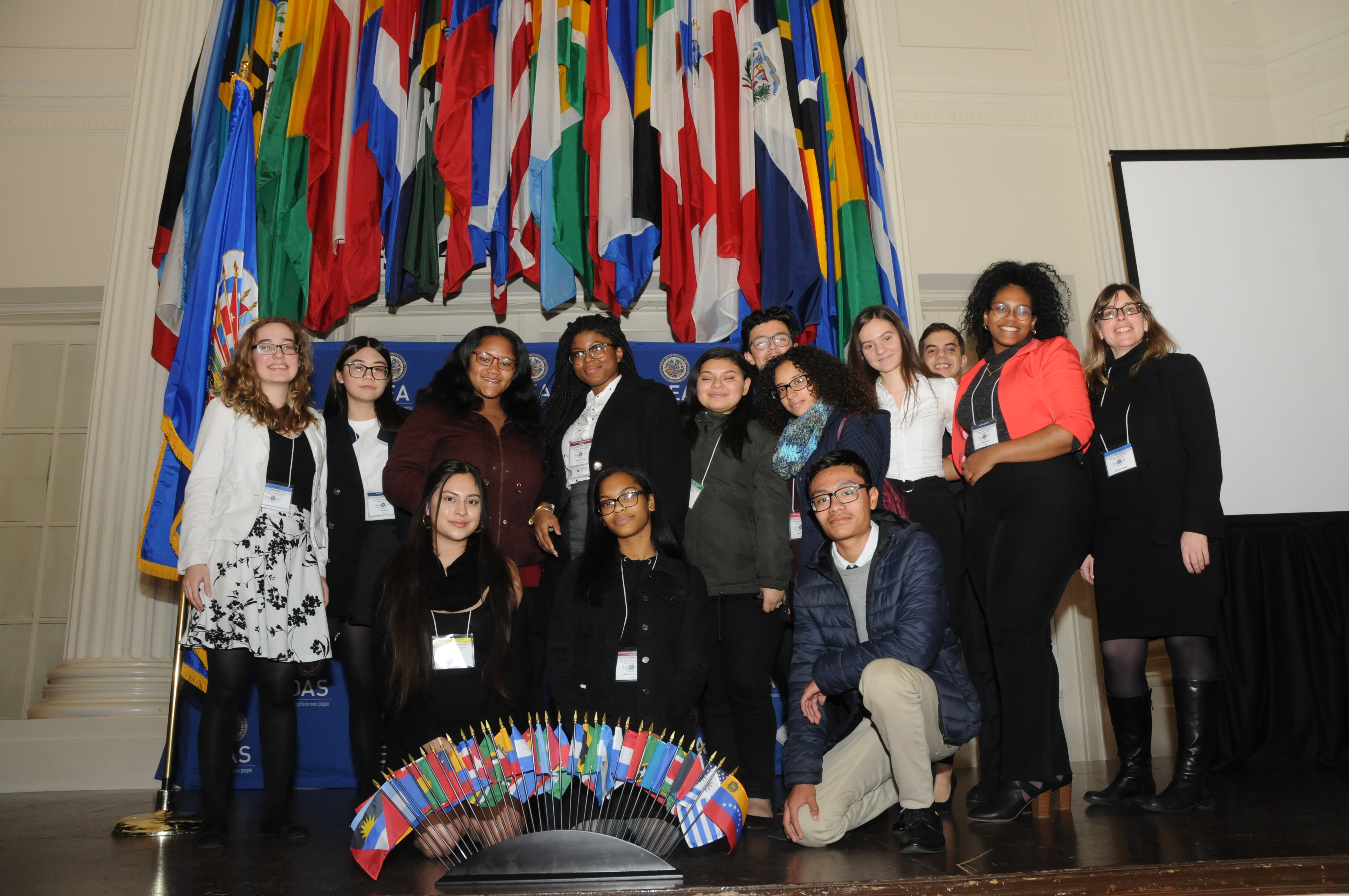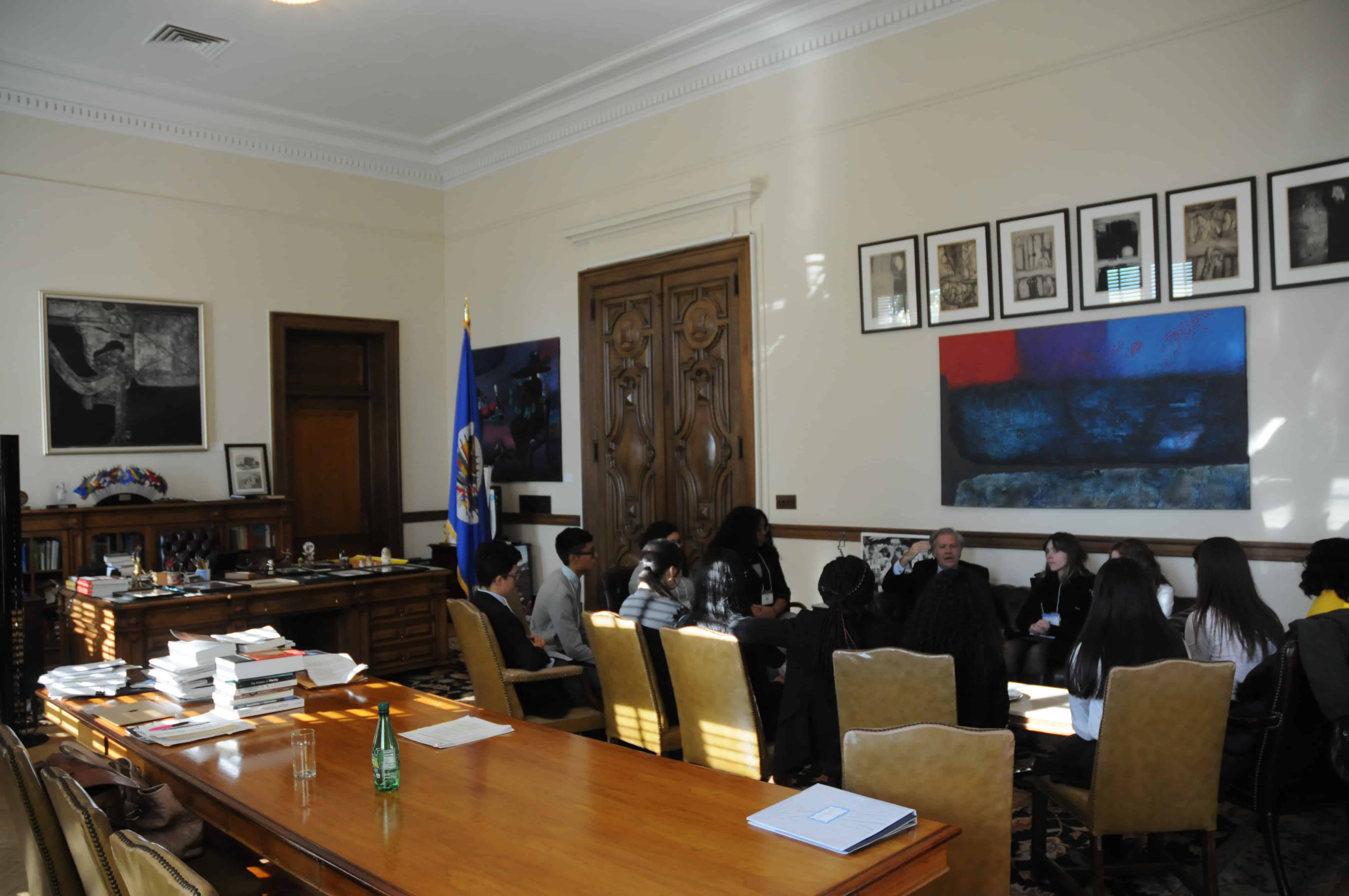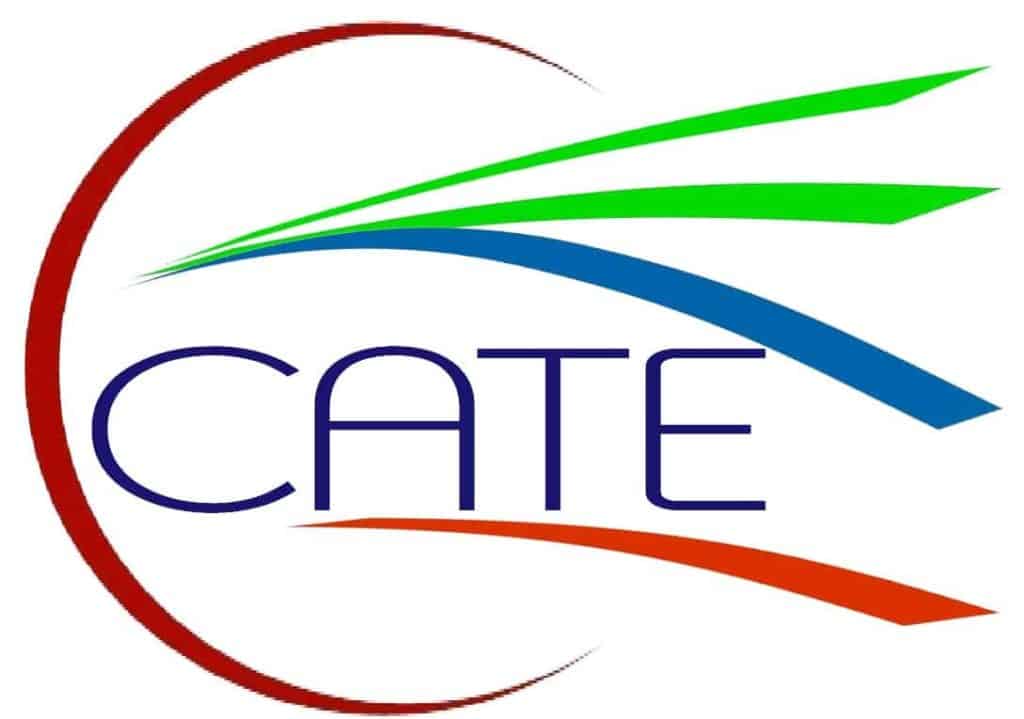News Release
For Immediate Release
December 5, 2018
Media Contact:
Cathy Bartch, Ph.D.
Associate Director
Latin American & Latino Studies Program
411 McNeil Building, 3718 Locust Walk
University of Penns
Penn Model OAS program travels to Washington D.C. bringing Philadelphia and Norristown public high school students to represent the delegation of Chile; Program wins top award
Philadelphia and Norristown High School Students participating in the Penn Model Organization of American States (OAS) Program successfully represented the delegation of Chile at the 37th Model OAS General Assembly for High Schools at the Organization of American States in Washington, D.C. from November 28th to November 30th.
The Penn Model OAS program won the 2018 Model OAS Award for the program’s community engagement and outreach in making the Model OAS program accessible to more students in the Greater Philadelphia Area.
“We were honored to win this prestigious award that recognized our efforts in engaging local high school students in our program,” said Catherine Bartch, Associate Director of Latin American and Latino Studies at the University of Pennsylvania, which houses the Penn Model OAS program.

The Penn Model OAS program is multi-year, university-community based program that links Penn university students, Philadelphia District (PSD) high school students, and Norristown-area high school students who attend educational programming at the Centro de Cultura, Arte, Trabajo y Educación (CCATE). The students are engaged in collaborative teaching, research, and service.
Created by the Latin American and Latino Studies program, the Penn Model OAS Program is built around two LALS undergraduate courses that allow students to participate in conferences that mirror the activities and public policy making of the OAS.
As part of the program, Penn undergraduates and public high school students represent OAS member countries at conferences in Washington DC during the spring and fall semesters. They prepare resolutions, negotiate with other representatives, and are given access to the OAS staff and its member missions.
The Penn undergraduates have been teaching and working together with the high school students in a fall semester course entitled Democracy in Trouble: OAS to the Rescue? Each week a group of Penn students has led the structured, active, in-class (SAIL) exercises on one of the four main pillars of the OAS – democracy, human rights, security, and development to prepare the high school students for the Model OAS in D.C.
The “Democracy in Trouble” course provides an interactive framework for learning in which university students mentor the high-schoolers and, in turn, clarify their own knowledge by the process of teaching it to others.

Maria (Francesca) Arruda de Amaral (’20), the Teaching Assistant for the course, commented that “the class is different from many others because it employs a structured, in-class, active learning pedagogy where undergraduates learn from developing curriculum they carry out.”
The High School Model OAS General Assembly (MOAS) in D.C. is a simulation exercise of the proceedings of the annual regular sessions of the General Assembly of the OAS. During the conference, high school students engage in general debate, lobbying, negotiation, and participate in working groups to adopt resolutions that tackle several issues across the Americas such as sustainable development, discrimination against gender identity and sexual orientation, big data initiatives, and corruption.
“Meeting people from different parts of the world really expanded my perspective on how big the world is. Meeting people form Belize, Puerto Rico, and other places opened me up to new ideas and experiences that I was not exposed to before.”
“The work wasn’t just for fun, it actually had meaning behind it, [because] it will actually serve as a prototype or guide to the actual OAS.” said Diego Ledesma, one of the high school students from Norristown and the CCATE program who participated in the MOAS program. “They told us that they went over the resolutions and took them into consideration,” he added.
Diego Ledesma represented the delegation of Chile in the Fourth Committee where he engaged in debate about harnessing big data for development and humanitarian action. With his working group, he wrote up a resolution that served to provide solutions to the issue at hand.
“I believe this program is crucial in helping these high school students understand the issues plaguing the region today, as well as enhancing their critical thinking skills and come up with realistic solutions to these problems,” said Eva Lardizabal (’20), a current Penn undergraduate majoring in Political Science who is enrolled in the course.
“It was also very rewarding for me as an undergraduate to watch the high schoolers put into practice what we have taught them all semester” added Lardizabal. Eva Lardizabal has also participated in the college iteration of the Model OAS conference (WMOAS) while she was enrolled in International Organizations in Latin America course last spring, another component of the Penn Model OAS Program.
The Penn Model OAS receives generous funding, support, and resources from the following partners: Fox Leadership International, Andrea Mitchell Center for the Study of Democracy, Netter Center for Community Partnerships, Penn Global, and the Centro de Cultura, Arte, Trabajo, y Educación (CCATE), a community organization.
“This cohort of 11 extremely committed, intelligent, and creative high school students would not have had the opportunity to participate in the Model OAS program in D.C., or meet with the Secretary General or visit to Penn Biden Center for Diplomacy and Global Engagement, without the generous support of the University of Pennsylvania,” said Dr. Tulia Falleti, Director of the Latin American and Latino Studies Program.
“We feel privileged that our program has the opportunity to engage and work with local public high school students, and to deepen ties with their schools and community organizations, such as CCATE,” said Dr. Falleti.
“Most importantly, we are thrilled that we can educate and instill and a sense of the importance of Latin America and democracy among youth at a very young age,” added Dr. Falleti.
Obed Arango Hisijara, the Executive Director of CCATE, the non-profit organization in Norristown dedicated to the empowerment of the Latinx community via art, work, and education said “the students of the [Penn Model OAS program in partnership with CCATE] are immigrants or son or daughters of Latin American immigrants.” He said “[T]his opportunity for them, and their parents is very meaningful and represents a landmark because it closes gaps and open opportunities.”
In the upcoming academic year, LALS will be doing research and evaluation, including developing a participatory research program, to evaluate the impact of Penn Model OAS on high school students’ education and civic and global engagement.
To learn more about the Penn Model OAS program, please contact lals@sas.upenn.edu for more information or visit the website here: https://lals.sas.upenn.edu/welcome-penn-model-oas
Cathy Bartch, Ph.D.
Associate Director
Latin American & Latino Studies Program
411 McNeil Building, 3718 Locust Walk
University of Pennsylvania
Philadelphia, PA 19104-6209
Tel: 215-898-9919
Email: bartch@upenn.edu
 The Penn Model OAS program is multi-year, university-community based program that links Penn university students, Philadelphia District (PSD) high school students, and Norristown-area high school students who attend educational programming at the Centro de Cultura, Arte, Trabajo y Educación (CCATE). The students are engaged in collaborative teaching, research, and service.
Created by the Latin American and Latino Studies program, the Penn Model OAS Program is built around two LALS undergraduate courses that allow students to participate in conferences that mirror the activities and public policy making of the OAS.
As part of the program, Penn undergraduates and public high school students represent OAS member countries at conferences in Washington DC during the spring and fall semesters. They prepare resolutions, negotiate with other representatives, and are given access to the OAS staff and its member missions.
The Penn undergraduates have been teaching and working together with the high school students in a fall semester course entitled Democracy in Trouble: OAS to the Rescue? Each week a group of Penn students has led the structured, active, in-class (SAIL) exercises on one of the four main pillars of the OAS – democracy, human rights, security, and development to prepare the high school students for the Model OAS in D.C.
The “Democracy in Trouble” course provides an interactive framework for learning in which university students mentor the high-schoolers and, in turn, clarify their own knowledge by the process of teaching it to others.
The Penn Model OAS program is multi-year, university-community based program that links Penn university students, Philadelphia District (PSD) high school students, and Norristown-area high school students who attend educational programming at the Centro de Cultura, Arte, Trabajo y Educación (CCATE). The students are engaged in collaborative teaching, research, and service.
Created by the Latin American and Latino Studies program, the Penn Model OAS Program is built around two LALS undergraduate courses that allow students to participate in conferences that mirror the activities and public policy making of the OAS.
As part of the program, Penn undergraduates and public high school students represent OAS member countries at conferences in Washington DC during the spring and fall semesters. They prepare resolutions, negotiate with other representatives, and are given access to the OAS staff and its member missions.
The Penn undergraduates have been teaching and working together with the high school students in a fall semester course entitled Democracy in Trouble: OAS to the Rescue? Each week a group of Penn students has led the structured, active, in-class (SAIL) exercises on one of the four main pillars of the OAS – democracy, human rights, security, and development to prepare the high school students for the Model OAS in D.C.
The “Democracy in Trouble” course provides an interactive framework for learning in which university students mentor the high-schoolers and, in turn, clarify their own knowledge by the process of teaching it to others.
 Maria (Francesca) Arruda de Amaral (’20), the Teaching Assistant for the course, commented that “the class is different from many others because it employs a structured, in-class, active learning pedagogy where undergraduates learn from developing curriculum they carry out.”
The High School Model OAS General Assembly (MOAS) in D.C. is a simulation exercise of the proceedings of the annual regular sessions of the General Assembly of the OAS. During the conference, high school students engage in general debate, lobbying, negotiation, and participate in working groups to adopt resolutions that tackle several issues across the Americas such as sustainable development, discrimination against gender identity and sexual orientation, big data initiatives, and corruption.
“Meeting people from different parts of the world really expanded my perspective on how big the world is. Meeting people form Belize, Puerto Rico, and other places opened me up to new ideas and experiences that I was not exposed to before.”
“The work wasn’t just for fun, it actually had meaning behind it, [because] it will actually serve as a prototype or guide to the actual OAS.” said Diego Ledesma, one of the high school students from Norristown and the CCATE program who participated in the MOAS program. “They told us that they went over the resolutions and took them into consideration,” he added.
Diego Ledesma represented the delegation of Chile in the Fourth Committee where he engaged in debate about harnessing big data for development and humanitarian action. With his working group, he wrote up a resolution that served to provide solutions to the issue at hand.
“I believe this program is crucial in helping these high school students understand the issues plaguing the region today, as well as enhancing their critical thinking skills and come up with realistic solutions to these problems,” said Eva Lardizabal (’20), a current Penn undergraduate majoring in Political Science who is enrolled in the course.
“It was also very rewarding for me as an undergraduate to watch the high schoolers put into practice what we have taught them all semester” added Lardizabal. Eva Lardizabal has also participated in the college iteration of the Model OAS conference (WMOAS) while she was enrolled in International Organizations in Latin America course last spring, another component of the Penn Model OAS Program.
The Penn Model OAS receives generous funding, support, and resources from the following partners: Fox Leadership International, Andrea Mitchell Center for the Study of Democracy, Netter Center for Community Partnerships, Penn Global, and the Centro de Cultura, Arte, Trabajo, y Educación (CCATE), a community organization.
“This cohort of 11 extremely committed, intelligent, and creative high school students would not have had the opportunity to participate in the Model OAS program in D.C., or meet with the Secretary General or visit to Penn Biden Center for Diplomacy and Global Engagement, without the generous support of the University of Pennsylvania,” said Dr. Tulia Falleti, Director of the Latin American and Latino Studies Program.
“We feel privileged that our program has the opportunity to engage and work with local public high school students, and to deepen ties with their schools and community organizations, such as CCATE,” said Dr. Falleti.
“Most importantly, we are thrilled that we can educate and instill and a sense of the importance of Latin America and democracy among youth at a very young age,” added Dr. Falleti.
Obed Arango Hisijara, the Executive Director of CCATE, the non-profit organization in Norristown dedicated to the empowerment of the Latinx community via art, work, and education said “the students of the [Penn Model OAS program in partnership with CCATE] are immigrants or son or daughters of Latin American immigrants.” He said “[T]his opportunity for them, and their parents is very meaningful and represents a landmark because it closes gaps and open opportunities.”
In the upcoming academic year, LALS will be doing research and evaluation, including developing a participatory research program, to evaluate the impact of Penn Model OAS on high school students’ education and civic and global engagement.
To learn more about the Penn Model OAS program, please contact lals@sas.upenn.edu for more information or visit the website here: https://lals.sas.upenn.edu/welcome-penn-model-oas
Cathy Bartch, Ph.D.
Associate Director
Latin American & Latino Studies Program
411 McNeil Building, 3718 Locust Walk
University of Pennsylvania
Philadelphia, PA 19104-6209
Tel: 215-898-9919
Email: bartch@upenn.edu
Maria (Francesca) Arruda de Amaral (’20), the Teaching Assistant for the course, commented that “the class is different from many others because it employs a structured, in-class, active learning pedagogy where undergraduates learn from developing curriculum they carry out.”
The High School Model OAS General Assembly (MOAS) in D.C. is a simulation exercise of the proceedings of the annual regular sessions of the General Assembly of the OAS. During the conference, high school students engage in general debate, lobbying, negotiation, and participate in working groups to adopt resolutions that tackle several issues across the Americas such as sustainable development, discrimination against gender identity and sexual orientation, big data initiatives, and corruption.
“Meeting people from different parts of the world really expanded my perspective on how big the world is. Meeting people form Belize, Puerto Rico, and other places opened me up to new ideas and experiences that I was not exposed to before.”
“The work wasn’t just for fun, it actually had meaning behind it, [because] it will actually serve as a prototype or guide to the actual OAS.” said Diego Ledesma, one of the high school students from Norristown and the CCATE program who participated in the MOAS program. “They told us that they went over the resolutions and took them into consideration,” he added.
Diego Ledesma represented the delegation of Chile in the Fourth Committee where he engaged in debate about harnessing big data for development and humanitarian action. With his working group, he wrote up a resolution that served to provide solutions to the issue at hand.
“I believe this program is crucial in helping these high school students understand the issues plaguing the region today, as well as enhancing their critical thinking skills and come up with realistic solutions to these problems,” said Eva Lardizabal (’20), a current Penn undergraduate majoring in Political Science who is enrolled in the course.
“It was also very rewarding for me as an undergraduate to watch the high schoolers put into practice what we have taught them all semester” added Lardizabal. Eva Lardizabal has also participated in the college iteration of the Model OAS conference (WMOAS) while she was enrolled in International Organizations in Latin America course last spring, another component of the Penn Model OAS Program.
The Penn Model OAS receives generous funding, support, and resources from the following partners: Fox Leadership International, Andrea Mitchell Center for the Study of Democracy, Netter Center for Community Partnerships, Penn Global, and the Centro de Cultura, Arte, Trabajo, y Educación (CCATE), a community organization.
“This cohort of 11 extremely committed, intelligent, and creative high school students would not have had the opportunity to participate in the Model OAS program in D.C., or meet with the Secretary General or visit to Penn Biden Center for Diplomacy and Global Engagement, without the generous support of the University of Pennsylvania,” said Dr. Tulia Falleti, Director of the Latin American and Latino Studies Program.
“We feel privileged that our program has the opportunity to engage and work with local public high school students, and to deepen ties with their schools and community organizations, such as CCATE,” said Dr. Falleti.
“Most importantly, we are thrilled that we can educate and instill and a sense of the importance of Latin America and democracy among youth at a very young age,” added Dr. Falleti.
Obed Arango Hisijara, the Executive Director of CCATE, the non-profit organization in Norristown dedicated to the empowerment of the Latinx community via art, work, and education said “the students of the [Penn Model OAS program in partnership with CCATE] are immigrants or son or daughters of Latin American immigrants.” He said “[T]his opportunity for them, and their parents is very meaningful and represents a landmark because it closes gaps and open opportunities.”
In the upcoming academic year, LALS will be doing research and evaluation, including developing a participatory research program, to evaluate the impact of Penn Model OAS on high school students’ education and civic and global engagement.
To learn more about the Penn Model OAS program, please contact lals@sas.upenn.edu for more information or visit the website here: https://lals.sas.upenn.edu/welcome-penn-model-oas
Cathy Bartch, Ph.D.
Associate Director
Latin American & Latino Studies Program
411 McNeil Building, 3718 Locust Walk
University of Pennsylvania
Philadelphia, PA 19104-6209
Tel: 215-898-9919
Email: bartch@upenn.edu

